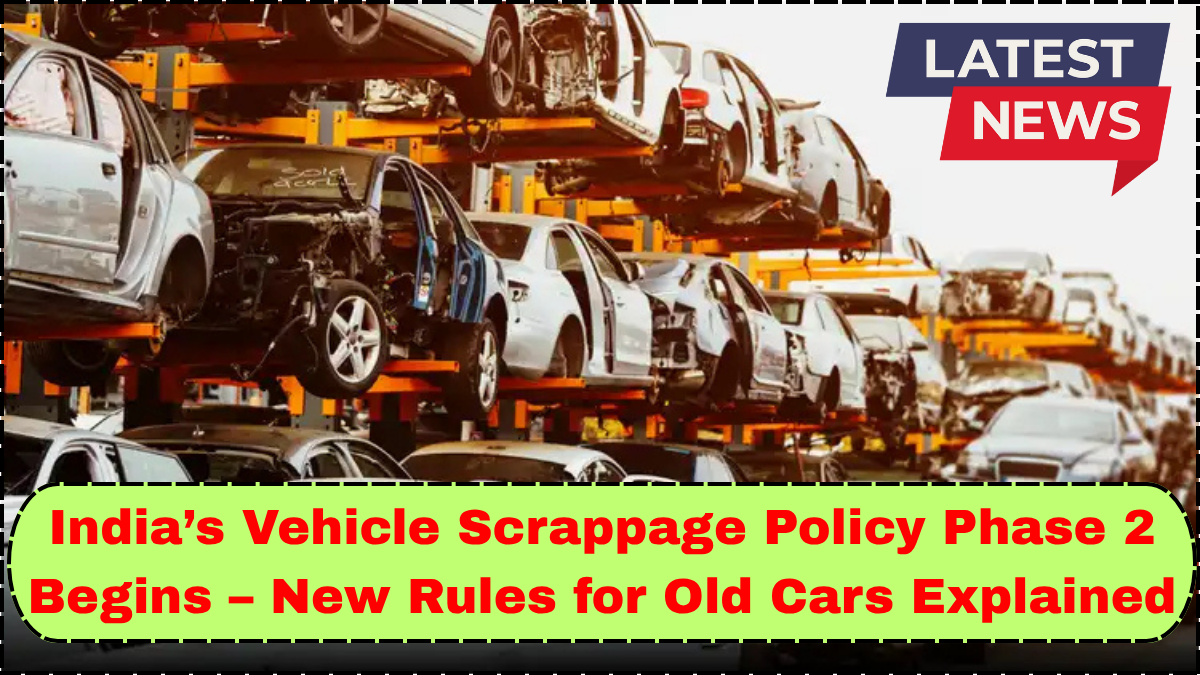India has officially rolled out Vehicle Scrappage Policy Phase 2, marking a crucial step toward reducing vehicular pollution, modernizing the automotive fleet, and supporting the circular economy. Announced as part of a broader effort to phase out polluting vehicles and stimulate the automobile sector, this second phase brings significant updates affecting both private and commercial vehicle owners.
Let’s break down what the policy entails, who it impacts, and how it changes the way India deals with aging vehicles.

What is the Vehicle Scrappage Policy Phase 2?
The Vehicle Scrappage Policy Phase 2 India is a government initiative designed to identify and systematically retire vehicles that are old, unfit, and environmentally harmful. It builds on Phase 1, which primarily targeted commercial vehicles. Phase 2 extends the framework to include private vehicles as well.
Under this phase, vehicles that have reached the end of their defined life cycle will either have to pass stringent fitness test requirements or be scrapped. The goal is to remove inefficient and high-emission vehicles from Indian roads, thereby improving air quality and promoting road safety.
Key Highlights of Phase 2
1. Old Car Ban Update
Private vehicles older than 20 years and commercial vehicles older than 15 years will now face stricter checks. If these vehicles fail the fitness test or lack valid registration, they will be deregistered.
This effectively acts as an old car ban, especially in high-pollution zones where regional transport offices (RTOs) are expected to enforce the rules more strictly.
2. Fitness Test Requirement for All Vehicles
Starting from April 2025, all vehicles that reach the defined age limit must undergo an Automated Fitness Test at registered testing stations. These tests will check:
- Emissions compliance
- Roadworthiness
- Safety standards
- Engine performance
Failing the test means mandatory scrappage unless the vehicle undergoes significant repairs and retests successfully. Fitness certification is valid for 5 years and must be renewed.
3. Voluntary Vehicle Scrappage Incentives
To encourage compliance, the government offers various incentives:
- Scrappage certificate that can be used to claim discounts on new vehicle purchases (up to 25% rebate on road tax)
- Waiver of registration fees
- OEM (Original Equipment Manufacturer) discounts
These benefits aim to soften the financial impact for vehicle owners who opt for voluntary scrapping.
4. Mandatory Scrapping for Government Fleets
As a leading-by-example move, all government-owned vehicles older than 15 years, regardless of fitness status, will be mandatorily scrapped. This directive covers central and state government departments, public sector units, and municipal vehicles.
Environmental and Economic Impacts
India’s auto industry stands to benefit from the increased demand for new vehicles, while pollution levels may see a decline as older vehicles—typically heavy polluters—are phased out.
The Vehicle Scrappage Policy Phase 2 India is also designed to boost the recycling industry. Steel, plastic, and rare earth materials recovered from scrapped vehicles can re-enter the production cycle, reducing dependency on raw material imports.
Implementation Challenges
Despite the policy’s strong foundation, several challenges remain:
- Limited number of automated fitness test centers
- Lack of awareness among private vehicle owners
- Regional disparities in enforcement
To overcome these, the government is ramping up the number of authorized scrappage and testing centers and pushing public awareness campaigns.
FAQs
Q1. What vehicles are covered under the Vehicle Scrappage Policy Phase 2 India?
A: All private vehicles older than 20 years and commercial vehicles older than 15 years are covered under Phase 2.
Q2. Is the fitness test requirement mandatory for all vehicles?
A: Yes. Once a vehicle crosses the age threshold, passing an automated fitness test is mandatory to retain its registration.
Q3. What happens if a vehicle fails the fitness test?
A: It must be scrapped or repaired and retested successfully. If it fails again, scrappage becomes compulsory.
Q4. Are there incentives for scrapping old vehicles?
A: Yes, including discounts on new vehicle purchases, road tax rebates, and waiver of registration fees.
Q5. When will the policy be fully enforced?
A: Enforcement began in stages and will be fully operational by April 2025 for all private and commercial vehicles.
click here to learn more